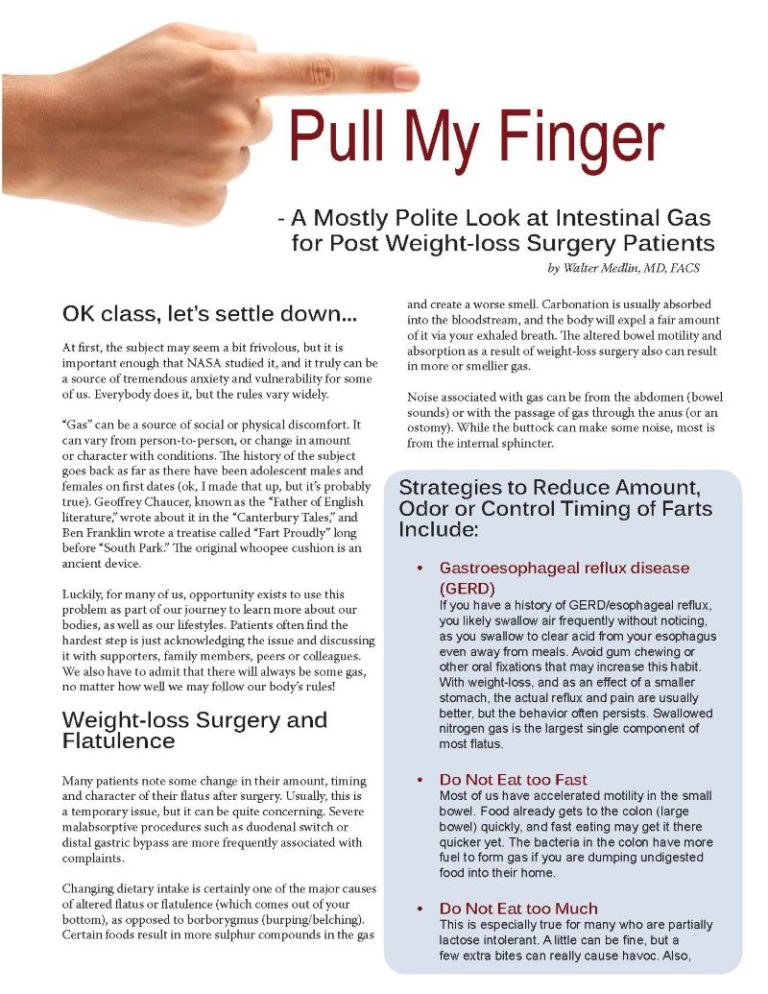Pull My Finger – A Mostly Polite Look at Intestinal Gas for Post Weight-loss Surgery Patients


by Walter Medlin, MD, FACS
Spring 2012
OK class, let’s settle down…
At first, the subject may seem a bit frivolous, but it is important enough that NASA studied it, and it truly can be a source of tremendous anxiety and vulnerability for some of us. Everybody does it, but the rules vary widely.
“Gas” can be a source of social or physical discomfort. It can vary from person-to-person, or change in amount or character with conditions. The history of the subject goes back as far as there have been adolescent males and females on first dates (ok, I made that up, but it’s probably true). Geoffrey Chaucer, known as the “Father of English literature,” wrote about it in the “Canterbury Tales,” and Ben Franklin wrote a treatise called “Fart Proudly” long before “South Park.” The original whoopee cushion is an ancient device.
Luckily, for many of us, opportunity exists to use this problem as part of our journey to learn more about our bodies, as well as our lifestyles. Patients often find the hardest step is just acknowledging the issue and discussing it with supporters, family members, peers or colleagues. We also have to admit that there will always be some gas, no matter how well we may follow our body’s rules!
Weight-loss Surgery and Flatulence
Many patients note some change in their amount, timing and character of their flatus after surgery. Usually, this is a temporary issue, but it can be quite concerning. Severe malabsorptive procedures such as duodenal switch or distal gastric bypass are more frequently associated with complaints.
Changing dietary intake is certainly one of the major causes of altered flatus or flatulence (which comes out of your bottom), as opposed to borborygmus (burping/belching). Certain foods result in more sulphur compounds in the gas and create a worse smell. Carbonation is usually absorbed into the bloodstream, and the body will expel a fair amount of it via your exhaled breath. The altered bowel motility and absorption as a result of weight-loss surgery also can result in more or smellier gas.
Noise associated with gas can be from the abdomen (bowel sounds) or with the passage of gas through the anus (or an ostomy). While the buttock can make some noise, most is from the internal sphincter.
Strategies to Reduce Amount, Odor or Control Timing of Farts Include:
- Gastroesophageal reflux disease (GERD)
If you have a history of GERD/esophageal reflux, you likely swallow air frequently without noticing, as you swallow to clear acid from your esophagus even away from meals. Avoid gum chewing or other oral fixations that may increase this habit. With weight-loss, and as an effect of a smaller stomach, the actual reflux and pain are usually better, but the behavior often persists. Swallowed nitrogen gas is the largest single component of most flatus.
- Do Not Eat too Fast
Most of us have accelerated motility in the small bowel. Food already gets to the colon (large bowel) quickly, and fast eating may get it there quicker yet. The bacteria in the colon have more fuel to form gas if you are dumping undigested food into their home.
- Do Not Eat too Much
This is especially true for many who are partially lactose intolerant. A little can be fine, but a few extra bites can really cause havoc. Also, overeating can be a stimulus to accelerated bowel motility and “dumping” (Dumping syndrome occurs when the undigested contents of your stomach move into your small intestine too rapidly. Common symptoms include abdominal cramps and nausea).
- Avoid Your Trigger Foods
Personally, I save breakfast burritos for the weekend! The most common complaint I hear is with additional dietary fiber for constipation. A few people find alcohol or lactose bad, and almost anyone will have a threshold of sorbitol (a non-digestible sugar) no more than a few grams a day. Rice is supposed to be one of the safest foods to not cause gas, so consider that when cooking or ordering a meal. Also, probiotic yogurt may be useful for irritable bowel symptoms in some and has little risk.
- Privacy
Go for a walk or find privacy before releasing gas (this is why you don’t go into the dictation room after a surgeon has been holding it in the operating room for a couple of hours).
- Medication/Supplements
Try considering a bismuth containing intestinal deodorant (Devrom is an example). You can also try antacids, but be careful and discuss this with your surgeon and dietitian. Seek medical attention if you have severe or persistent associated symptoms.
- Social Interactions in the Workplace
Try bringing up the subject politely with colleagues. They will appreciate it. If I experience a “bad moment” as my nurse is rushing into my office while I am on the phone, I hold up my hand. It does pay to clarify the hand signal ahead of time.
- Out and About
On an airplane, use a fleece sweater as cushion (also helps with fatigue). At the gym, look for cardio machines near the fan or vent, remember extra effort can cause uncontrolled release when you lift weights.
Conclusion
Remember, part of what makes us laugh about this is the social discomfort we all have with gas. Again, the most important message is to give your body and gut time to adapt. The first year after weight-loss surgery is often very different from later years, and some real change occurs in the ability of the gut to absorb at various locations.
This article is just an overview, and there is some useful medical literature, but not much. The Wikipedia entry is a worthwhile starting point for further information. Thanks also to Michelle Henderson, RN, for input on this subject. She is experienced in wound and ostomy care and has helped many patients with complex intestinal problems.
About the Author:
Walter Medlin, MD, FACS, is an OAC Advisory Board Member with Pacific Diabetes and Weight-loss Surgery in Bellingham, Washington. He struggled with his weight since first grade. After performing hundreds of weight-loss operations, he underwent sleeve gastrectomy in 2008, with outstanding results. Dr. Medlin is also a participating practice in the OAC Sponsored Membership Program where he gives each of his patients a one-year membership in the OAC.
by OAC Staff Members Kendall Griffey and Michelle “Shelly” Vicari Winter 2024 In a world that often…
Read Articleby Rachel Engelhart, RD; Kelly Donahue, PhD; and Renu Mansukhani, MD Summer 2023 Welcome to the first…
Read ArticlePost-operative addiction is often overly simplified as transfer addiction or cross-addiction, assuming individuals “trade” compulsive eating for…
View Video









